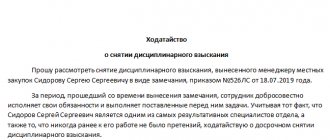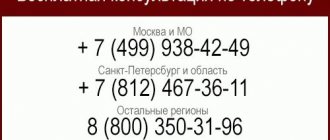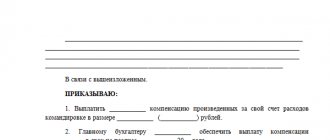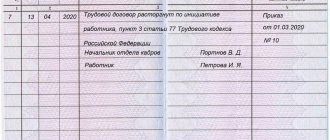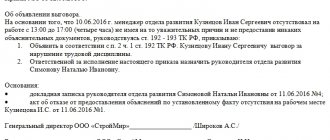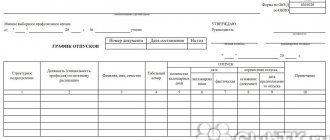Penalties are designed to increase the sense of responsibility for one’s own actions and clearly argue for the need to adhere to labor discipline. They are usually used as last resort measures against persistent violators. The first remark serves as a kind of warning, which, if ignored, leads to the application of other, more stringent measures.
We will learn about disciplinary measures under the labor code in this article https://otdelkadrov.online/6107-usloviya-poryadok-privlecheniya-rabotnika-k-materialnoi-otvetstvennosti-vzyskanie-ushherba
As a rule, the presence of a penalty is reflected in the amount of wages. This encourages the employee to improve his work performance in order to have grounds to petition for the removal of the punishment. Since the imposition of disciplinary measures is not some kind of irreversible act, which is its positive side.
Application for removal of disciplinary sanction, sample
Application of disciplinary measures
Penalties are not recorded in the work book. There is a special form T-2, upon registration of which the order number is indicated. In any case, regardless of the violation, when applying for penalties, it is necessary to ensure compliance with the Labor Code. An employee should not be subject to more than one penalty. The violator must be aware of the rules of internal discipline, and his personal signature must be on the relevant document. The time period between the order and the offense should not be more than six months.
The punishment order is prohibited from being applied during the period:
- public service employees;
- vacation and sick leave periods.
The employee must personally familiarize himself with the order and draw up an explanatory note. The recovery must comply with the deadlines specified in the Labor Code; its extension is also possible, but only in accordance with the law.
An employee who has been subject to a penalty has the right to challenge it if it was applied in violation of the provisions of the law. And as a rule, such labor disputes are resolved in favor of the employee and his guilt will be unproven.
Instructions on how to appeal and remove a penalty
- A complaint is sent to the labor inspectorate.
This can be done through the website or by registered mail with notification. Describe your view of events with which you disagree, provide information about your organization. - We are waiting for the results.
Inspectors will come to the employer with an inspection and scrupulously check the procedure for imposing penalties. If they find violations, they will issue an order to eliminate them. - Contact the labor dispute commission.
The Labor Code of the Russian Federation allows three months for this. If the deadline is missed, be prepared to confirm that the reasons why the deadline was missed are valid. - Wait for the Commission's decision.
- If the answer is not satisfactory, go to court. Part 2 art. 390 of the Labor Code warns that you need to appeal within 10 days.
Professional assistance from lawyers will help employees and employers. Lawyers from the website “33 Yurista.ru” will explain complex issues and, if necessary, represent the client in court and government agencies in labor disputes.
Duration of disciplinary action
The collection can be considered invalid if 1 year has passed since the time the order was accepted. If an unscrupulous employee is punished again before the end of this period, the validity period of the first order is reset and a new period is established from the date on which the new order was approved. This allows you to record two punishments at once. This may lead to the emergence of grounds to record the fact of repeated violations. The manager has the right, according to the Labor Code, to dismiss the employee. For the latter, the penalty will not directly affect the future career.
Transferring to another position at the enterprise does not affect the duration of the measures or the termination of the order. Removal of penalties is carried out by decision of the manager or upon termination of the employment relationship, since such orders are distributed only within the organization.
Cancellation after expiration
The employer can cancel the order ahead of schedule; for this, a new order is also issued. If the validity period has expired, it will be canceled automatically without issuing a special document. The employee also does not have to be notified. But the employee must take this situation seriously and strictly observe internal discipline during the term and avoid repeated violations.
The employee may be on vacation or absent from the workplace for other reasons; his presence at the workplace is not necessary for automatic removal of the penalty. But this only applies to reprimands and remarks. If we are talking about dismissal, cancellation does not apply to this type of penalty.
A penalty that has expired cannot be a basis for denying an employee incentives, i.e., it should not have any consequences. This also applies to wages, which take into account bonuses and other material rewards. Interrupted working hours are also taken into account for the possibility of obtaining titles.
Remarks can be automatically removed when the employee, from the moment of signing the order of collection, no longer violates the internal labor discipline of the enterprise.
Article 51
6. A disciplinary sanction must be imposed no later than two weeks from the day when the direct manager (supervisor) or immediate supervisor (supervisor) became aware of the commission of a disciplinary offense by an employee of the internal affairs bodies, and in the case of an internal audit or initiation of a criminal case - no later than one month from the date of approval of the conclusion based on the results of an internal audit or the adoption of a final decision in a criminal case. The specified periods do not include periods of temporary incapacity for work of the employee, being on vacation or on a business trip. 4. The right to impose a disciplinary sanction granted to a subordinate manager (supervisor) also has the direct manager (supervisor). If it is necessary to impose a disciplinary sanction on an employee of the internal affairs bodies that the relevant manager (supervisor) does not have the right to impose, he petitions for the imposition of this disciplinary sanction before a superior manager (superior).
Grounds for cancellation of penalties
An employee has the right to early cancellation of a collection order under the following circumstances:
- conscientious work during the period of validity of the order;
- fulfillment of the established work plan beyond the norm;
- participation in the life of the team;
- identification and prevention of accidents and other violations;
- introducing rationalization proposals and new techniques.
If the employee has corrected himself, the following may intercede on his behalf: the head of the enterprise or organization, the employee himself, the head of the local trade union, a guarantor from the team, the boss of the punished employee himself. The initiator of the appeal must receive a link so that he can arrange a newsletter for recipients (Article 194 of the Labor Code of the Russian Federation). The employee must read the order to lift the penalty and sign.
What is the basis for issuing an order?
An order to lift a disciplinary penalty is justified for a variety of reasons. It could be
- personal decision of the director, who considered that the employee fully atoned for his guilt,
- request from the immediate supervisor of the employee subjected to reprimand,
- The trade union committee (if there is one at the enterprise) has the right to petition for the cancellation of the order.
- or the employee himself (in this case, a personal statement in writing is required).
It should be noted that such requests do not guarantee that the company’s management will accommodate the offending employee – in this case, the mutual consent of the parties plays a role.
When is it necessary to cancel a disciplinary order?
The need to cancel a disciplinary order arises in different situations. For example, the employer became aware of new circumstances of the offender’s misconduct, and they largely level out the degree of his guilt.
Or the punishment must be canceled after receiving a court decision, which provides evidence of the employer’s failure to fulfill the requirements of fairness and proportionality of the punishment (resolution of the plenum of the Supreme Court of the Russian Federation dated March 17, 2004 No. 2).
Whatever the reasons for canceling the previously issued document on punishment, a new order will have to be drawn up.
Who initiates early withdrawal
Employee. If he realizes his guilt, he can himself make a proposal to reduce the effect of his punishment, for example, in the following formulation: “I realized my guilt. I have had no complaints from senior management about the results of my work since the day of the offense. From now on I undertake not to violate labor discipline. I ask you to cancel the disciplinary sanction ahead of schedule.” If such a document comes from an employee, it is endorsed by the immediate supervisor.
Trade union or other representative body. He sends his arguments in the form of a petition to the head of the organization. You can use the following wording: “During the time that has passed since the imposition of the penalty, Petrov P.P. fully complies with the requirements of labor discipline that are established at the enterprise, and has also proven himself to be an excellent worker; he efficiently fulfills the labor duties assigned to him. There have been no complaints against him recently.”
The employee's immediate supervisor. If he considers that the person brought to justice is worthy of repaying the punishment ahead of schedule, then he draws up an appeal addressed to the head of the organization with a request for its early cancellation. In this case, you can use the same text as in the example for the trade union.
Head of the organization. If the initiative to shorten the period of disciplinary action comes from him, then the procedure is simplified. The head of the enterprise, having drawn a conclusion from his own observations, can make a decision orally and bring it to the personnel department to issue an order to repay the penalty. In this case, there is no need to submit any petition.
Removal of foreclosure
When the penalty is canceled by the director, he must issue the order himself. If the request comes from other persons, then a petition is submitted to the manager. This document must indicate the persons who have read the order, namely: the violator himself, the initiator of the petition, and an employee of the personnel department.
The canceled punishment must be entered on the T-2 card, the order number and the date of its entry into force. If the work schedule is violated a second time after the order is drawn up and signed, the cancellation will not be extended. It will not serve as a basis for repeated misconduct by the employee.
How long does a severe reprimand last?
Perhaps that is why the list of penalties is split and expanded for employees of the Ministry of Internal Affairs. This list comes with a strong reprimand and serves as a sort of “Chinese final warning” before more drastic measures are taken. This means that within a year a repeated violation may end: Citizens employed by the Ministry of Internal Affairs are more oriented in their work to special laws relating to their activities. The main difference from the majority of workers is that the military and employees of the Ministry of Internal Affairs do not work, but serve. To some extent, this means a stricter attitude towards dereliction of duty and an increased responsibility before the law and society.
Please note => Power of attorney from a legal entity to a legal entity sample
Petition for removal of foreclosure
It is issued in the name of the manager. The document must contain the reasons for the disciplinary sanction, the facts for early termination of the order, and the full name of the punished employee. At the end of the petition the number of the order and the date of its entry into force are indicated.
The document must be signed by the immediate supervisor of the violator, the chairman of the trade union. The protocol (its number) must be attached to it. Representatives of the team who were present at the meeting also sign.
Procedure for issuing a certificate
Art. 62 of the Labor Code of the Russian Federation provides that the employer is obliged to issue copies of documents related to the employee’s work, as well as various certificates, within 3 working days from the moment the employee submits a corresponding written application.
This document must contain the following:
- Full name, position of the head of the employing organization;
- the word "Statement";
- the employee’s request to issue him a certificate indicating that he has no outstanding disciplinary punishment;
- date of application;
- personal signature of the employee.
The application is submitted to the office or secretary of the head of the organization. The document is registered, during which it is assigned an incoming number. You can draw up an application in 2 copies, on one of which the secretary puts the date of receipt, the assigned number and returns it to the employee. The head of the organization writes this document for direct execution to the personnel department or the person responsible for personnel records.
